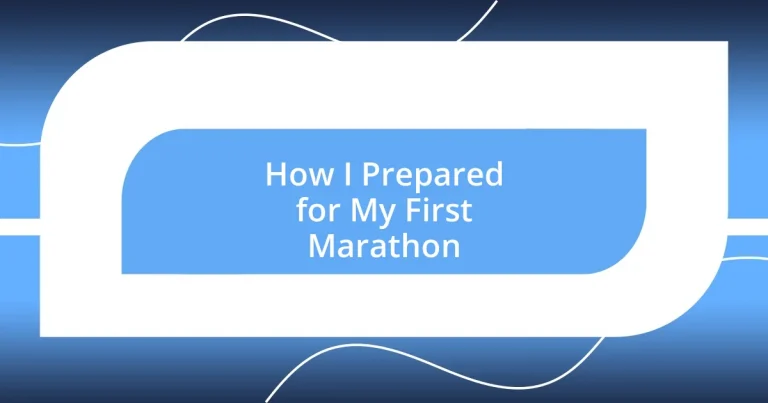Key takeaways:
- Successful marathon training requires a balance of mental preparation, pacing, and setting realistic goals to foster enjoyment and progress.
- Incorporating cross-training, proper nutrition, and focus on recovery are essential for improving performance and preventing injuries.
- Mental strategies such as visualization, breaking the race into smaller goals, and positive self-talk can significantly enhance race day performance.

Understanding marathon basics
Understanding the basics of a marathon is essential for any first-time runner, and it’s more than just about covering 26.2 miles. I remember my first encounter with the distance; the idea of running a marathon was both exhilarating and daunting. Why do so many people choose to take on such a colossal challenge?
First, it’s vital to grasp that a marathon isn’t just about physical endurance; it’s a mental game too. During my training, I hit walls that I mentally never thought I could overcome. I learned the importance of mental fortitude. It begs the question, how can you prepare your mind for that moment when you want to quit?
Then there’s the practical side, like understanding pacing. Initially, I struggled with running too fast at the start, which left me drained halfway through. I eventually learned to listen to my body – pacing is key. After all, have you ever experienced that moment of realization when you finally find your rhythm during a long run? It feels like magic.

Setting realistic goals
Setting realistic goals is crucial when preparing for your first marathon. I vividly remember setting an initial target of finishing under four hours, inspired by seasoned runners around me. However, during training, I quickly realized that pushing too hard can lead to burnout or injury. As a result, I shifted my focus to completing the race, no matter the time. This change not only alleviated pressure but also allowed me to enjoy the training process more.
Another essential aspect is breaking your goal into manageable milestones. For instance, rather than fixating solely on the marathon, I celebrated smaller achievements like completing my first long run or hitting a new personal best in a shorter race. Each little victory kept my motivation alive and made the journey feel less overwhelming. Have you ever felt that rush of accomplishment after reaching a milestone? It’s invigorating!
Lastly, I genuinely believe that flexibility in your goals is important. Life can be unpredictable, and my training was no exception. There were days when my body just didn’t cooperate, and I had to adjust my plans. This taught me to listen to my body and adapt accordingly. Isn’t it liberating to know that it’s okay to adjust your goals to fit your current reality?
| Aspect | Realistic Goal |
|---|---|
| Time Target | Finish the marathon |
| Milestones | Celebrate each long run |
| Flexibility | Listen to your body and adjust |

Creating a training plan
Creating a training plan was a transformative experience for me, akin to mapping my journey toward the marathon finish line. I started by outlining a weekly schedule that included a mix of long runs, speed work, and rest days. This blend was not just an arbitrary choice; I learned the hard way that overdoing it on any one type of run can lead to exhaustion. I vividly recall those early weeks, feeling invigorated after a long run, only to realize I had to dial back my enthusiasm to avoid burnout.
To put my plan into action, I embraced several key components:
- Weekly Mileage Goals: I gradually increased my mileage, ensuring I didn’t exceed 10% more each week.
- Variety in Training: Mixing long runs, tempo runs, and intervals kept my training engaging.
- Rest and Recovery: I allocated specific rest days, realizing their importance for injury prevention and mental refreshment.
As I settled into this new routine, I experienced a blend of excitement and anxiety. There were days when running felt like a burden, but those moments also helped me discover my resilience. Each run became a self-exploration—an opportunity to test my limits and learn what worked best for my body. That gradual progress became a comforting rhythm in my life.

Incorporating cross-training methods
Incorporating cross-training methods was a game-changer for my marathon preparation. I remember the first time I tried cycling instead of running on a rest day. It felt refreshing to use different muscles while still keeping my endurance up. I was pleasantly surprised to find that my legs felt rejuvenated, and I could approach my next run with more energy. Have you ever noticed how a change in routine can give you a boost when you need it most?
I also found that strength training played a crucial role in my overall fitness. Committing to two weekly sessions not only improved my running efficiency but also helped prevent injuries. I can still recall the first time I completed a set of lunges and felt stronger than ever. It was a small victory, but it propelled me forward, making me believe in my ability to tackle the marathon distance. Have you considered how building strength could enhance your running performance?
Additionally, yoga became a surprisingly essential part of my regimen. I started attending classes for flexibility and mindfulness, which countered the relentless pounding from running. One session, enveloped in that serene atmosphere, led to a lightbulb moment for me. I realized that mental strength is just as important as physical training. Isn’t it fascinating how different forms of exercise can intertwine, enriching not just our bodies but our minds too?

Nutrition tips for marathon training
When it came to nutrition during my marathon training, I quickly learned that what I fuel my body with was just as critical as my running schedule. I vividly remember my early attempts to power through a long run on a simple breakfast of toast, only to find my energy dipping significantly. After some experimentation, I discovered that incorporating a balance of carbohydrates, proteins, and healthy fats transformed my stamina. Have you ever felt the difference a solid meal can make before a workout? For me, a hearty bowl of oatmeal topped with banana and almond butter became my go-to pre-run fuel.
Hydration was another revelation for me as I progressed. In those initial weeks, I underestimated its importance and faced some frustrating dehydration during my long runs. I learned the hard way that even a slight dip in hydration levels could affect my performance. Now, I’ve realized that hydration is an ongoing process, not just something to think about on a run day. Always having a water bottle within reach became second nature, helping me keep my body primed and ready.
Lastly, I can’t stress enough the importance of recovery nutrition after long runs. I found that refueling with a protein-rich snack or meal within 30 minutes played a pivotal role in my recovery. One evening, I recall enjoying a post-run smoothie made with Greek yogurt and berries. The delicious combination not only replenished my energy but also felt like a well-deserved treat after the hard work. Isn’t it amazing how the right nutrition can turn recovery into a moment of celebration rather than just a chore?

Managing injuries and recovery
Injuries can be a runner’s worst nightmare, and I experienced this firsthand when I felt a sharp pain in my knee late in training. It took me by surprise, but I knew that rather than pushing through the agony, I had to listen to my body. I decided to take a step back and focus on rest and rehabilitation. Have you ever had to pause your journey for your health? It can be disappointing, but crucially necessary.
In those recovery days, I discovered the beauty of targeted stretching and foam rolling. I remember the first time I rolled out a sore muscle, the tension melted away, and I could almost feel the knots in my legs unraveling. I made it a habit to dedicate ten minutes daily to self-care. It truly paid off as I watched my body bounce back much more quickly than I anticipated. Isn’t it empowering to think that a little attention to your needs can significantly change your recovery experience?
As I returned to training, the importance of gradual progression became crystal clear. I remember feeling eager to jump back into my routine, but I forced myself to ease into it, increasing my mileage slowly. This patience helped me avoid re-injury and actually deepened my appreciation for the process. Have you ever found a silver lining in a setback? For me, that moment was realizing that respecting my body’s signals was just as vital as my determination to cross the finish line.

Mental strategies for race day
On race day, I relied heavily on visualization techniques to prepare myself mentally. I vividly imagined crossing the finish line, feeling the surge of joy and accomplishment. This technique helped me combat nerves and keep my focus on the end goal. Have you ever visualized a big moment in your life? For me, envisioning that success made the nerves feel less daunting and the distance ahead more manageable.
Another strategy that proved invaluable was setting small, manageable milestones throughout the race. Instead of fixating on the entire 26.2 miles, I broke it down into segments—focusing on getting to each water station or the next mile marker. I remember when I reached mile 10; I felt a surge of pride. Celebrating those little victories kept my spirits high, even when fatigue began to creep in. What little milestones could you celebrate to keep your energy up?
Lastly, I practiced positive self-talk to combat those moments of doubt. I remember one particularly tough stretch when my legs felt like lead and my mind started to waver. In that moment, I kept repeating affirmations like “You’ve got this” and “Every step is closer to the finish.” It transformed my mindset from one of struggle to one of determination. Have you thought about what words you would need to hear to power through challenges? Finding a mantra that resonates with you could be the key to unlocking your potential on race day.














